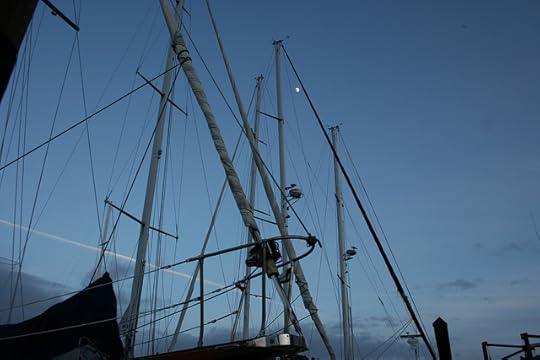Daniel Hardman's Blog, page 5
January 6, 2013
at iguazu falls
January 4, 2013
“It’s sad enough to shade your face”
It’s sad enough to shade your face
in rooms where women waltz their words,
dissecting Michaelangelo,
and smile, tree-hungry, weary of the art.
But when the partly-living go
I strain to sense your absence, now.
The last I knew you was the day
the dog barked out her ecstasy
and wagged to see me coming near
and jumped and whined and wouldn’t sit,
deaf to all my peevish threat.
And in her honest artlessness,
she licked her way right through to you,
and you and she played peek-a-boo
while I observed with distant eyes,
half enthralled despite myself.
But I have lately lost you, friend,
from waltzing one too many times
to worn-out seem and reputation;
and yet, your memory bids me cry:
above the beat, shout me your name.
I know you have one, mirror man.

photo credit: Ralph-Thompson (Flickr)

January 3, 2013
moon in masts at dusk
January 2, 2013
Cantata
I always knew that he really was not lazy. In spite of the impression that he left at school, Alec was a very hard worker. It was just that he chose to pour his soul into music instead of homework. He didn’t fail entirely, but his grades were miserable. Lawrence and I had both been honor students, and it hurt us to find that our child just was not interested in academics.

Photo credit: jayneandd (Flickr)
Sometimes when Alec walked in after school with his textbooks buried in reams of music-covered staff paper, I was especially angry at myself for ever starting my son on music. He was gifted, I knew—perhaps more gifted than anyone had ever been before. Only a month after the lessons began, my little boy had written his first sonata. I didn’t have the heart to spoil his confidence in the music by playing it in front of him. only after Alec had gone to sleep did I softly play the piece on the old grand piano. To my delight, the piece worked; it was utterly charming. How I wished, though, that I had not encouraged Alec so much after that—doubling his lessons, furnishing materials, even buying him an advanced synthesizer for his seventh birthday.
But I had not foreseen the hold that Alec’s passion for music could exert; everything else was secondary. Alec would come home from school and disappear into his room, emerging only for a hurried meal after much scolding. He spent hours sitting at his desk, pen in hand, writing page after page of flawless, stunningly beautiful music. He wrote everything—concertos, fugues, etudes, oratorios, even symphonies. And they were all good. Not just pretty or technically correct; Alec’s works were masterpieces. Always.
When Alec finished a piece, he’d yawn, stretch, and perhaps play and record it on his synthesizer. If he did play, it was always once through, and it was always perfect. After he finished playing it, he’d take out the tape of his newly recorded music, add it to the stacks that filled several boxes in his closet, and put the written music on the bookshelves that lined an entire wall of his room. By the time Alec was eight, he had filled almost half of them with sheet music.
I dreaded parent-teacher conferences. They were a time when I was humiliated by my son’s poor performance. But at first I endured them, thrilled by Alec’s phenomenal ability, and confident that as he matured he would turn his attention back to school. After all, how much music could one human being write before he ran out of ideas?
But when Alec brought home his first report card of third grade, my patience ran out. Alec’s grades had always been bad, but for the first time they now included an F—my son had flunked spelling. I wasn’t about to let my child be illiterate. And so I spanked him, hard. Alec said nothing; he only walked quietly to his room with tears streaming down his freckled cheeks and a hurt look on his face.
I waited tensely, expecting an outburst as the door closed. I heard nothing. After a minute of suspense, I opened the door. Alec was writing music furiously. As I advanced into the room, he bent intently over his work, covering his paper from my gaze with an arm and his hunched shoulders.
Seeing my son too caught up in his music even to cry touched a raw nerve. I lashed out recklessly.
“Alec, you’re going to shape up. Now. If your grades don’t improve a full letter grade by next report card, your career in music is finished. And right now, you’re grounded from all music indefinitely. I’m sick and tired of having to talk to teachers who tell me how lazy and disinterested you are. I don’t know how to respond, since they’re absolutely right. You haven’t done anything worthwhile since you started composing. You never talk, or say anything to us. All I want is a little bit of consideration for my feelings. Do you think I like being though of as the mother of an eight-year-old idiot who can hardly write? well, I’m sick of you and your music. Things are going to change!”
And change they did. Alec’s tapes, synthesizer, and other music paraphernalia were confiscated. Every day when Alec got home from school, I sat him down and supervised him while he did his homework. I drilled him for a full hour a day on spelling. It was slow going. Alec claimed absolutely no capacity to memorize the random, “pointless” arrangements of letters. I don’t know why—he could memorize hours of music effortlessly. When I asked him why spelling was so hard, he would shrug his shoulders and say “Words are all gray and scratchy. There’s no harmony.” Alec listened to me spell in total apathy.
At last, however, repetition began to take its toll. More by the sequence of syllables than by anything else, Alec began to spell. He still hated it, but at least he could pound out the words. He spelled mechanically, longing always (I could tell) for his forbidden music. One day, Alec was sitting in a chair, pathetically silent under my flow of letters. His eyes were defocused, his thoughts far away. Suddenly he gasped as if in utter amazement. His jaw dropped, his face filled with an ecstatic light. He burst into tears.
Alec was obviously very happy about something. I decided not to reprimand him for his inattention—besides, I was curious to know what he was so thrilled about.
“Mother,” Alec murmured in delight, “Oh, it is so beautiful! I’ve never heard anything so…” He gave up trying to describe it, but jumped up and hugged me impulsively, tears streaming down his cheeks.
“Mother, you’ve got to let me write down this music. I promise I will do anything—for the rest of the school year I won’t even touch my music. I’ll memorize every spelling word there is—anything! Just give me a couple days to write down this music. It’s a cantata, and it’s the gorgeousest music in the world. Please!”
Alec’s face was glowing with hope and excitement. It was really difficult to turn him down. But I knew that spelling was more important for a boy his age, so I told him he’d have to wait until the end of the grading period. Then he would be free to do music, provided his grades were high enough. Alec’s face fell, and he began to weep wildly. He refused to be consoled. Every day that week Alec pleaded desperately with me to let him write his cantata down. Each time I denied him he became more and more desperate, but I stayed firm. Alec was nearly hysterical; writing the music was so important that once I even caught him in the middle of the night, tears rolling down his cheeks, writing. The look on his face when I took the music away was pure agony, but I knew that it had to be done.
Finally I managed to impress Alec with the fact that school would come first—he had better buckle down, or music might be permanently denied. Once Alec came to terms with that, I had never seen him work harder. He fairly poured himself into his schoolwork. His teachers reported that Alec was listening and participating in class for the first time, he was doing well on tests. Spelling continued to be a nemesis for him, though. He spent tedious hours copying words hundreds of times, until his head ached and his poor little heart was weary of the effort.
I was nervous on report card day, but not for long. Alec burst in, his face radiating sunshine. “Mom!” was all he could say. He just stood there dumbly, holding out his card in a trembling hand. A’s and B’s—and an A in Spelling. I was relieved.
“Now can I get out the music stuff?” He asked so eagerly that I had to laugh.
“Can you promise me that you’ll keep up in school now?” Alec nodded hastily. “Then yes,” I smiled, “you’ve certainly earned it.” Alec departed in a mad rush, shrieking and trembling with delight. He went straight to my closet, where I had hidden the staff paper. Grabbing a big stack of the sheets, he sat down at the kitchen table with a pen and spread the blank pages before him.
Alec’s hand hovered over the paper. His face beamed, and his freckled cheeks were damp with tears. I had never, never seen him so excited about anything before. He paused. I waited expectantly for the confident, unerring scratching that always marked Alec’s composing efforts. But it didn’t come. Alec’s face changed. His eyebrows knit, his smile faded in concentration. Then his eyes widened, he gave a shriek of pure anguish, and began sobbing hysterically. I could get nothing out of him except “gone.” After a moment he rushed over to the piano in a frenzied panic, and began to play. But the notes were rushed, fumbled, wrong. Alec collapsed again.
“Alec,” I whispered soothingly, “I’m sure it will come back to you. Nothing that important ever leaves permanently.” Alec shook his head in dumb misery.
“You didn’t hear me, Mother. It’s not the music that’s gone, it’s me. It can’t be the same any more. I’m all words and fractions now.” He searched my face for a moment, then ran to his bed and collapsed. I rocked him slowly to sleep.
The applause died down as Alec stepped to the center of the stage. He took a deep breath, remembering how hard he had worked to perform well tonight. He felt himself hot behind the stiff white collar. The audience tensed in expectation. As he stepped up to the microphone, his hands trembled. “Cantata…” he announced. He paused for a long time. A very long time. He smiled at his mother, sitting anxious on the edge of her chair. “Cantata,” he said again. “C-A-N-T-A-T-T-A.”

January 1, 2013
Booksong
The song of the book lit his eyes as he ran,
and pulled in my arms to encircle his waist.
“Read story!” he shouted, while impatient hands,
pressed open the cover and fumbled in haste.
Soprano pronouncements subsided, fell still;
he snuggled and sighed while I whispered the tale.
Loved ragged, I basked in his artless, pure spell
and squeezed my I love yous no language can tell.
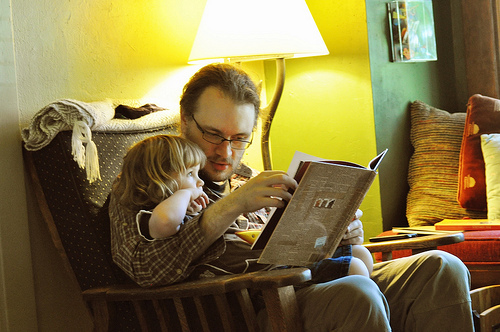
photo credit: liquidnight (Flickr)

December 30, 2012
The Big Picture
As a child I loved to look at Richard Scarry books. Though the words were sparse, they were full of huge, full-color, meticulously detailed illustrations. I can remember staring at one particular scene for perhaps an hour, trying to absorb all the creatures, colors, shadows, and other minutiae of the drawing. In the end I concluded that such an aim was nearly hopeless: no matter how long or carefully I looked I could still look longer, and perhaps find something new.
When I was a freshman in college I was assigned to observe nature and then write a paper detailing what I learned. As I did my nature study, my experience with books as a child came to mind. I realized that nature, like Richard Scarry’s pictures, is only more wonderful and complex as it is examined closely, and that its secrets are inexhaustible.
Such a conclusion was not always evident, though. I began observing nature by watching bees, and at first that’s about all I saw. Bees flying from flower to flower. Ho hum… But when I really began observing, I saw a lot more. For one thing, I had never seen such hard work and devotion to a single purpose. They landed on the flowers and without a moment to rest began gleaning the nectar. The bees were so busy that even before finishing one flower, they would start to walk toward another, tilting and rolling their heads to continue sucking as they walked. After a few flowers, the bees would take to the air and randomly select a new patch.
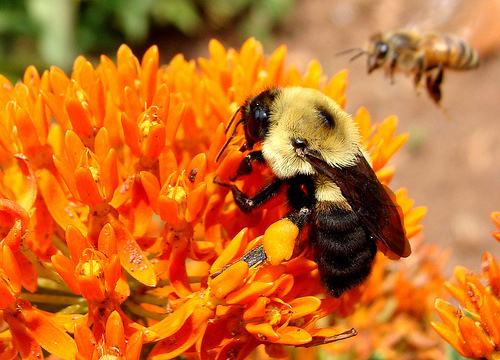
Photo credit: Martin LaBar (Flickr)
As my attention to detail grew, I noticed that even as the bees flew they had their proboscises extended—they began sucking nectar before their feet touched the flowers. Soon I discovered individual variations in the bees, such as the amount of pollen on their legs. I also found that the bees actually had some direct effect on their environment; the tiny flower petals bent with the weight of the insects, and once some dust and debris on the ground was blown away by the downwash from a bee’s wings. I was completely captivated when my observation time ended. As I walked away from the flower bed I wondered what sights I was leaving behind.
Two days later I went out to observe again. As I walked along, a small stream caught my eye, and I paused to examine it more closely. At first I saw only one thing—black water. As I focused my attention, however, a mini-world appeared. The water was dark, and obscured the bottom of the ditch almost fully, but it was clear, not murky. The current was fairly slow, but strong. As I sat I saw leaves in the water, carried along and tumbled, alternatingly rising and sinking with the push of the flow. They were many-colored—yellow, rust, cream, brown, orange, even faintly lavender. The current also carried assorted blades and clumps of grass and water plants along. Some water bugs with long front legs which they used like oars skated across the surface. I could see the dimples which their feet made in the surface; each time the bugs swept their front legs back to move, they created tiny concentric ripples which crossed with those of the other bugs to form a wavy checkerboard of water wrinkles.
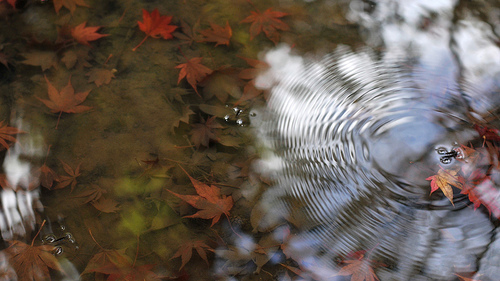
Photo credit: Minette Layne (Flickr)
Generally the creatures stayed to the side, where the current curled back on itself. Periodically they would drift into the central current, though, and then they had to work hard to return to their little corner. Where the surface changed from shadow to sun I spotted a sparse group of whitish, gnat-like insects. They flew a few inches above the surface, circling and swerving lazily. I was about to dismiss them from my attention when I noticed something very strange—they seemed to be flying against an air current just like that of the stream. Although they constantly flew toward the shade, they never seemed to get there, but stayed just barely in the sunlight.
Eventually I left the stream and headed for the flower bed. I had to cross a parking lot on the way, and as I did I decided to see if there was any life on the faded asphalt. I squatted down and examined the dirty, worn pebbles for any signs of life. At first my search was entirely fruitless, but on the curb at the side of the lot I discovered all sorts of miniature arthropods. A few were nearly half as big as the head of a pin; the rest were smaller. One kind that was fairly prolific was a tiny red mite. Dozens of them were walking with nearly imperceptible legs on the hard cement. I was in a hurry, so I left, but as I did I found myself feeling much the same as I had when leaving the bees behind. My curiosity was piqued: what would I not get to see?
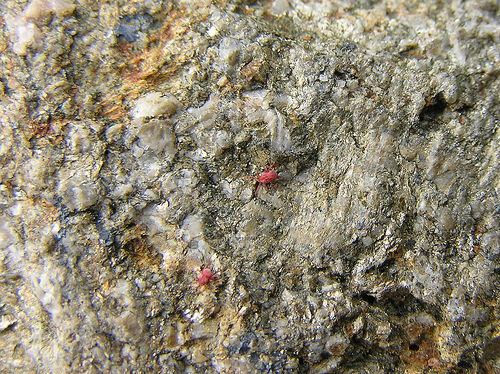
Photo credit: Crfullmoon (Flickr)
I was almost to the flowers when I walked past a small tree and noticed a faint glint on a leaf. The late afternoon sun was low enough to just tickle a few strands of spider web. There were four of them stretched from one end of a leaf to the other, like the strings on a primitive lyre. I could not see the spider, and wondered if perhaps it was dead, having starved after making such a tiny web in such an impractical (or at least unusual) form. As I turned to go I spied a much larger strand of spider web, floating free in the air. By moving my head slightly, I was able to move the sunlight along several feet of it. And then a breeze touche it lightly, and though I knew it was still there, I couldn’t see it at all.
I walked the rest of the way to the flower bed and looked around. The flowers were shaded, the bees gone. I was disappointed. I sat on a bench and began to take notes on the flowers anyway: “Around the outside edge are some lovely pink flowers about two feet high. They have five teardrop-shaped petals which whiten near the center…” I continued for five to ten minutes on the pink flowers before it occurred to me that my task was really quite difficult. Depending on how much detail I wanted to use, I could describe the pink flowers for ages. I waded my way through the description of the leaves of the pink flowers, but eventually I gave up. There was just too much to describe.
After I returned from my observation, I thought about what I had seen. What could I conclude? The best answer that I found was another question: What didn’t I see? From my experience, I was sure that I had missed the great majority of what was right before my eyes. Nature, I mused, is much like those marvelous Richard Scarry pictures. I can look and look and look, and as long as I look there will always be more to see.
Some think that ultimately mankind will know everything, if science is allowed to progress enough. My observations of nature, though, are a lesson in humility. They lead me to believe that such an idea is arrogant or at least unrealistic. I though I knew that bees were busy, but I had no idea that they were busy enough to extend proboscises while still in flight until I saw it; I still cannot comprehend the frenzy it must take to make their wings beat a thousand times per minute. I saw some red mites on the blacktop surface of a parking lot, but not the worms a foot beneath them. I saw flowers, but what I saw was actually only half of the plant. The roots remain hidden.
Each time I changed the scale of my observation, or altered my perspective or looked harder, I saw a previously unnoticed aspect of nature.
I underestimate the world.
The stream is more than water: it is cold black liquid, spotted with shade, pushing leaves, supporting water bugs, swaying seaweed, leaking into the ground and watering the world around it. Like flowers or the stream, the world also is more than meets the eye.
Though I can discover much more of the world than I thought possible, my vision (and perception in general) is limited. I can’t see the protozoa in a stream or the individual grains of pollen in a flower. It goes beyond that, though. I can’t see the roots of grass, the inside of a bee, or what is in the back of my head. And seeing is certainly not my only limited sense. The footsteps of a the red mites probably made a distinct pitter-patter; yet I didn’t hear it. I don’t know what air tastes like, or how nectar smells.
In a very real way, then, I get a simplified picture. Even in the best circumstances, some things—the overwhelming majority of things—go unnoticed. I need to remember some of my inadequacy and ignorance. As I learn to truly perceive, I will probably continue to find that the world is like a Richard Scarry picture—there is always something else to discover; always more, not less to learn.

December 23, 2012
Ethan and the Spider Web Machine
One day when Ethan came home from school, he was bored.
“Try playing on the swings,” said Mom.
“Dance with me,” said his sister, Maia.
“Trucks! Dey dwive fast!” said his brother, Caleb.
Ethan played on the swings. He danced with Maia. He drove trucks.
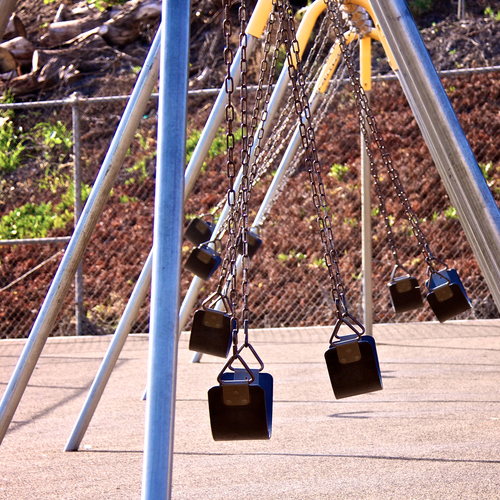
photo credit: Zoramite (Flickr)
He was bored.
“Help me bake cookies,” said Mom.
“Do gymnastics,” said his sister, Maia.
“Doodle bug! It tickles!” said his brother, Caleb.
Ethan ate lots of dough and chocolate chips. He did somersaults. He rolled doodle bugs.

Image credit: sarah sosiak (Flickr)
He was bored.
Then he got an idea.
He would make a spider web machine.
He got some hangars out of the closet in his bedroom. Maia got cotton balls from the bathroom. Caleb got an old banana peel out of the garbage in the kitchen.
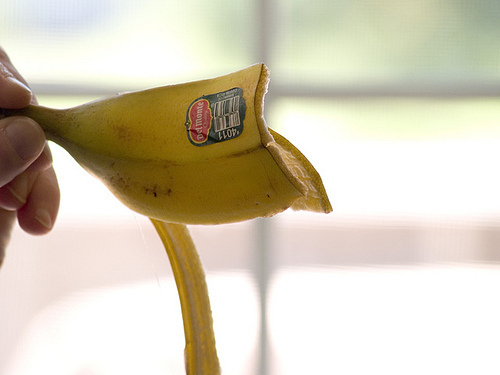
Photo credit: photograφ (Flickr)
Ethan scratched his head. It was not enough stuff.
He got the tricycle in the garage. Maia got a roll of red yarn from the basket by Mom’s bed. Caleb got a band-aid off his knee.

photo credit: clarkmaxwell (Flickr)
Ethan scratched his head. It was not enough stuff.
He got a roll of tape from the cupboard by the fridge. Maia got batteries out of her flashlight. Caleb got a can of fish flakes.
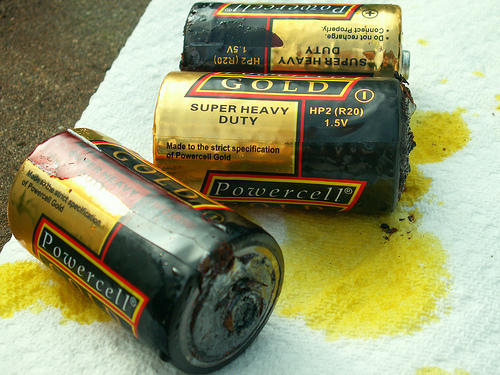
photo credit: GigerPunk (Flickr)
No, it was still not enough. Ethan needed help.
He went over and asked his friend Daniel for help.
Maia went over and asked her friend Meg for help.
Caleb went over and asked Mom to change his diaper. It was very stinky.
Daniel brought an old fishing rod, some shoelaces, and a remote-control car. Meg brought an empty peanut butter jar, a plastic spoon, and some bubble gum wrappers.
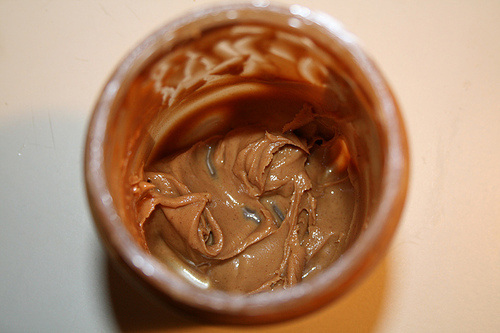
photo credit: D. Scott Lipsey (Flickr)
Ethan and Maia and Meg and Daniel spread everything out in the driveway and looked at it. Caleb sat on the peanut butter jar and looked as his doodle bug.
“What we need now,” said Ethan, “is a magic potion.”
“A magic potion!” said Meg.
“A magic potion!” said Daniel.
“A magic potion!” said Maia.
“A doodle bug!” said Caleb.
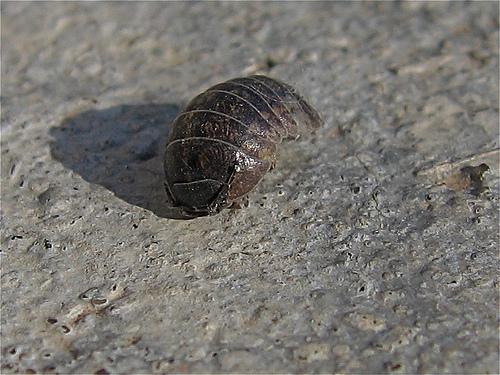
photo credit: Maggie Osterberg (Flickr)
Ethan got an old bucket. It had lots of dirt and a couple dead ants, and even a dusty cobweb at the bottom, so that was a good start. He turned on the hose and added water. Daniel used Meg’s plastic spoon to scrape the last little bits of peanut butter into the bucket. Caleb added his banana peel.
“Ala-kazaam!” said Ethan.
“Hocus pocus!” said Maia.
“Jeepers creepers!” said Daniel.
“Holy smokes!” said Meg.
“Abwacadabwa!” said Caleb.
The bucket sputtered. Purple smoke curled out the top, made a slow circle in the air over their heads, turned green, and then vanished with a sparkle of firecracker sounds.
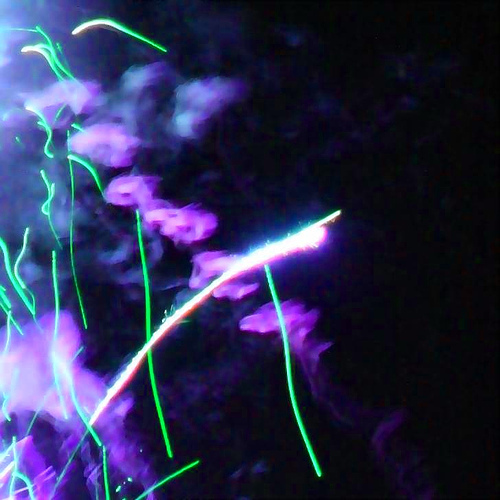
photo credit: TW Collins (Flickr)
Ethan grabbed the potion bucket and began to dance around, sprinkling droplets of foaming pink stuff all over the fishing rod, the tricycle, the yarn, the band aid, and the plastic spoon. And as he danced, he chanted:
Spiderweb, spiderweb in a dish.
How many pieces do you wish?
Pretty soon the other kids had joined in, and Meg was tossing bubblegum wrappers like flower petals at a wedding.
They chanted till they were hoarse. But the pile of junk did not turn into a spiderweb machine. And the magic potion was losing its fizz.
“It’s not working,” said Ethan. “We’re missing the magic ingredient.”
“What’s that?” asked Maia.
“Frog legs!” said Daniel.
“Ew, gross!” said Meg.
“Spit!” said Caleb. And he harunged and gakoxed and p-tooied right on top of the whole heap.

photo credit: magnificent momma (Flickr)
There was a clap of thunder, and a bright flash of light made them all close their eyes. When they opened them again, there it stood: a shiny new spiderweb machine, complete with windshield wipers and shiny chrome fenders.
“Awesome!” said Ethan.
“Hooray!” said Maia.
“Deadly!” said Daniel.
“Fungacoid!” said Meg.
“All aboawd!” said Caleb.
They drove around the neighborhood, spewing cobwebs all over the trees and Meg’s dog and the mail man and generally having a glorious time until Mom called Ethan in for supper.
“Aw, Mom. Do we have to?” said Ethan.
“What are we having?” asked Maia. “Can we have dessert first?”
“Spaghetti,” said Mom.
“You mean spidew web suwprise!” said Caleb. “Wight, Mom?”
“Wight!” she said. “But no doodle bugs on top.”

photo credit: preppybyday (Flickr)

December 19, 2012
Puddles
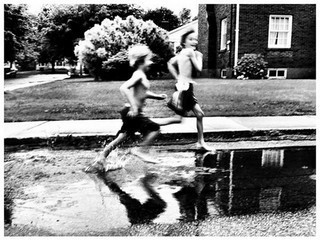
Photo credit: Rob Lantz (Flickr)
My friend, does rain still set you thinking
About our day of perfect puddle splendor?
We shook our plastered hair, and blinking,
Rubbed our chins to catch the water under.
And while I squinted in the luscious wet
You stomped me, squealing with delight;
I followed wild where your dodging led,
Splashing, sloshing madly left and right
Until we stopped our silly, breathless races
And shiver-giggled, dripping, shiny-eyed
And wiped the mud spots from our freckled faces
And grinned in eager rapture side to side.
Our wet palms met to end the playful strife,
And we were water brothers then for life.

To a Fisherwoman

Photo credit: swiss.frog (Flickr)
You come, bark between my heart, your bone.
I smile…
you nod, distant in yourself, alone.
I murmur at the tales you tell,
and listen to your lonely laughter,
and tease you, touch you, call and swell–
yet all too soon you go;
I am too terrible,
too beautiful to know.
Oh, I too know the cradle,
the two legs and the three.
And you ply me like an urgent reminder
that passes on, but never is forgotten…
You stir me, name me, scrutinize,
perhaps plumb me, now and then;
still, all too soon you go;
I am to foreign,
too comprehensible to know.
I wait for you, I wave to you–
I kiss the shore and wait,
I feed you
and I sing.
But all you sense is surface-song
and shrink my tempest-beat, and tedium.
How could you know?
My symphony is far below,
and I am too dangerous,
too comforting to know.
I am the sea; I am alone.
I shall not hold you forcefully;
though tender, soft
I were to speak with you below,
in the unknown depths–
of fish that dart like doubts
in shadows even I don’t know,
of innocence, of laughter and complexities,
of a hundred sad perplexities,
and of an overwhelming question
that I dare not offer in any other place–
yet, if compelled, you’re sure to go;
I am the sea,
and I am too painful,
too humorous to know.
So if, demanded, you will go,
I choose to wait to know instead:
to sing you with the subtle swell,
to lift you, gently when you come,
to cry and croon and smile you home,
and hope someday to fill your net
with treasure that I long to share,
but dare not show you yet, not quite.
For only when you truly come–
come to know, and then don’t shy,
in spite of my humanity–
then is when at last I’ll know:
I am not too alien to know.
And only then can I deliver
my overwhelming answer
to that lonely question:
I do.
I love you.
Yes,
Forever

Stacked — a play in one act
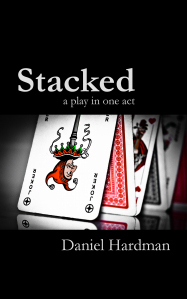 I took the one-act play that I wrote a while ago, and published it in book form and on Kindle. Fun project.
I took the one-act play that I wrote a while ago, and published it in book form and on Kindle. Fun project.
Here’s the description from the book’s back cover:
Are human beings doomed to muddle through a dreary existence, bereft of hope? Can we do better than put a brave face on it, as Camus recommended in “The Myth of Sysiphus”?
In this classic response to existential favorites such as “Waiting for Godot” and “Rosencrantz and Guildenstern Are Dead“, two actors wrestle with science, religion, an unseen director, and their own choices about how they’ll interpret the script they’ve been given.
Eminently readable and easy to stage, this edition of the play now includes discussion questions for classroom learning and book groups.




